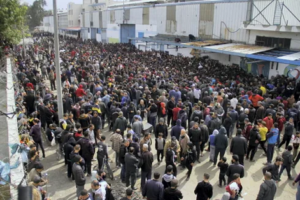Inside Israel’s disturbing denial of starvation in Gaza

Palestinians waiting for food distribution in the southern city of Rafah, Gaza Strip
Dahlia Scheindlin writes in Haaretz on 26 March 2024:
Among the ugliest spectacles of the ugliest phase of Israeli and Palestinian history is the attempt to deny the horrors committed by “our” side. Israeli authorities and pro-Israel keyboard warriors are cultivating denialism daily, and shamelessly.
In addition to waging a war of shocking brutality against civilians, the narrative-makers are busy doing the unthinkable: denying hunger in Gaza. Caveat: the word for “hunger” and “famine” are identical in Hebrew, but it’s splitting hairs to argue that they deny famine, not hunger. The aim is to absolve Israel.
These efforts range from clownish to methodical. Yoseph Haddad, Israel’s favorite Arab hasbarista, has proclaimed that there is no famine in Gaza – so it must be true. Some YouTuber named Tal Louria posted a selfie video simply saying there cannot be any famine in Gaza, because he hasn’t seen pictures of people starving “like in Africa.” Clearly he hasn’t looked hard enough (though one doesn’t need to).
Officials tend to be less clownish, with strategies of denial deflection. Just last week, Gilad Erdan, Israel’s ambassador to the United Nations, told Arutz 7: “If there is even a problem of lack of food in Gaza Strip – and we claim otherwise – only the Hamas terrorists are to blame, who loot humanitarian aid that Israel allows to enter with no limitations.”
Similarly, former Foreign Minister Eli Cohen’s insistence that: “I don’t know another country that would work like Israel is working to get humanitarian aid into Gaza. So, no preaching morality to us. The residents of Gaza are suffering, but Israel’s not to blame for what’s happening – Hamas and Iran are to blame.” It takes zero sympathy for Hamas – which is how much I have – to know that Israel controls the crossings and most of Gaza by now, and that Hamas carries blame but Israel is in charge.
Particularly disturbing efforts touch the edges and tactics of disinformation. Eylon Levy, until recently the primary English-speaking voice of Israel’s war, is among the chief defenders of Israel’s humanitarian credentials – so much so that he picked a fight against British Foreign Secretary David Cameron on the issue, which is what appears to have got him suspended last week.
Levy continues to crusade for Israel’s humanitarian righteousness. This involves retweeting a certain AGHamilton29, a mysterious but for hasbara purposes apparently unimpeachable source with nearly 156,000 followers on X, whose previous handle was “AG_Conservative.”

Palestinians gathering to receive aid outside an UNRWA warehouse in Gaza City, March 2024
He has written a handful of articles in the National Review, which identified his byline as “the pseudonym of a licensed attorney.” The articles accused “the media” of misleading readers about the rising threat of COVID-19 in 2020, where the author did his own research and made his own charts. He defended U.S. Sen. Tom Cotton and Facebook; what he didn’t do was devote a single article to Israel, Palestine and Gaza. Fair enough – it was 2019-2020, when the issue apparently didn’t exist.
This renowned authority on Gaza and famine has posted a screenshot of a post – the author and platform are absent, but Hamilton says that it was written “inside Gaza.” The unnamed post talks about the theft of food distribution; this mess is Levy’s killer evidence of Israel’s blamelessness.
It’s almost a marginal anecdote. I found the original Gazan post from a much more credible source – but this is how disinformation and conspiracies get started. They begin with kernels of truth – no one doubts that aid in Gaza is being violently intercepted, and that Hamas is part of the armed, toxic brew – but knotted into nonsensical narratives designed to uphold a predetermined conclusion that Israel has no role, no responsibility.
Acute food insecurity
If you want to know what’s actually happening in Gaza, there are professionals and experts to tell you – that’s what the Israeli government wants you to avoid. The Integrated Food Security Phase Classification has been tracking the risk and onset of famine with transparent methodology, data and on-the-ground sources; data is collected and analyzed via methods repeated around the world, in at least 54 different countries. The full report is available at a click.
The organization’s analysis, concluded in mid-March, found that 70 percent of Gazans in the north (about 210,000 people), are facing Phase 5 food insecurity – catastrophe. In the southern regions, where the hasbara crowds have been arguing vigorously that markets are open and food is plentiful, the report found that the Deir al-Balah, Khan Yunis and Rafah governates are in Phase 4 – a state of emergency. All of Gaza is facing acute food insecurity.
There are more people on the ground. The World Health Organization stated that the IPC report matched its direct experience servicing populations in Gaza since the start of the war. The WHO stated that “the IPC report confirms what we, our UN partners and nongovernmental organizations (NGOs) have been witnessing and reporting for months. When our missions reach hospitals, we meet exhausted and hungry health workers who ask us for food and water.”
You can talk to people from Gaza, with names, faces and phone numbers.
You could also listen to masses of Gazans themselves, through survey research: The Palestinian Center for Policy and Survey Research’s recent poll by Khalil Shikaki, conducted in early March, found that just one-third of Palestinians in Gaza or less had water and food “available” – the majority said they could access them “with great difficulty and risk.” Thirteen percent said water and food were simply not available at all. Meanwhile, 27 percent said that medical care was not available. The same portion said this about toilets; only 24 percent said they were available. That’s a formula for death.
Listen to the commissioner general of the UN Relief and Works Agency, who observed that all UNRWA food convoys to northern Gaza were blocked last week, even though 62 percent of Palestinians in the PSR survey said UNRWA is organizing their shelters.
Don’t like UNRWA? Listen to UN Secretary-General António Guterres as he watched a long line of trucks stand still, blocked for entry. Think about the story Israeli officials aren’t telling you behind the high number of trucks they claim entered in March: entire trucks can be turned back for including a pair of surgical scissors – categorized as dual use. But famine can’t be treated without full medical care; lack of clean water means that food requiring cooking water can’t be used properly.
Far greater catastrophe
The most prominent actor downplaying the humanitarian crisis and hunger is Israel’s Coordinator for Government Activities in the Territories, known as COGAT. Crowing that the number of food trucks entering Gaza is now 126 per day, higher than prewar truck entries, as COGAT foolishly tried to do, makes no sense: Tania Hary, director of Gisha, the Israeli human rights organization focused on Gaza, pointed out on X that before the war, nearly 2 million people were not displaced, they had local food production and agriculture (and they were still deprived relative to pre-closure crossings, 17 years ago). The need has grown exponentially; it can’t be compared to prewar demand, which wasn’t being met anyway.
COGAT conveniently began counting the daily average from March (126), when the average since October is 60 per day, according to Gisha – less than the prewar numbers – in a far greater catastrophe.
Most damningly, Gisha’s Hary says that neither COGAT nor any Israeli authority has published data to prove their own claims denying serious hunger or famine in Gaza. Gisha has submitted a freedom of information request on whether the government is monitoring the humanitarian situation – and, if so, how. “If they’re saying it’s not hunger, how do they know? They’ve never published anything indicating a methodology,” she said in an interview.
Denialists want you to just believe everyone else is wrong because they said so. They have their own facts. A cottage industry has already sprung up on the right denying the number of deaths in Gaza; one of them is at least authored by a data scientist (in Tablet) – a guy who also argued against vaccines in summer camps and seems comfortably ensconced at Wharton, far from Gaza. He graciously thanks the person who helped “check and correct” his numbers, a board member of Honest Reporting, an “Israel=good” media gotcha group. At least he linked to the source data: a single jpeg file, with no identifying markings and no link or source indicated. In fact, if the number of deaths in Gaza are off, they’re probably being undercounted.
What do these denialists want? The aims range from insisting on Israeli moral superiority to fending off a genocide verdict at the International Court of Justice. Or maybe, as Hary believes, “The idea that Israel’s not responsible is at the heart of everything – all roads lead back to that. It’s a vacuum of responsibility.” But most of all, they want you to ignore the evidence, ignore firsthand knowledge, ignore actual experts in the field with transparent data and methodology, but listen to the crackpots. Then a government that uses these tactics can say – and do – anything.
This article is reproduced in its entirety
